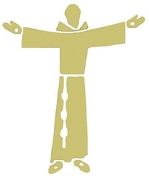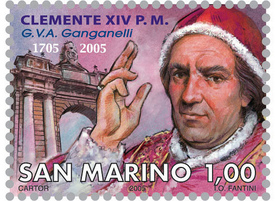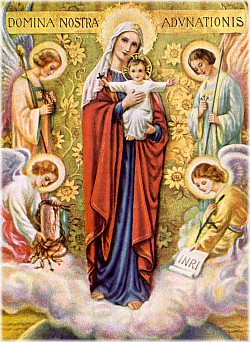 The Capuchins in Italy are taking time to reflect on
the greatest God-given gift they've received: work of 100 years among the native Brasilian
peoples. What really struck me was the Provincial's comment: "And we truly lived it as
a gift: participating in His mission, that is to say, the mission of Jesus
Christ."
The Capuchins in Italy are taking time to reflect on
the greatest God-given gift they've received: work of 100 years among the native Brasilian
peoples. What really struck me was the Provincial's comment: "And we truly lived it as
a gift: participating in His mission, that is to say, the mission of Jesus
Christ." Franciscans: July 2009 Archives
 The Capuchins in Italy are taking time to reflect on
the greatest God-given gift they've received: work of 100 years among the native Brasilian
peoples. What really struck me was the Provincial's comment: "And we truly lived it as
a gift: participating in His mission, that is to say, the mission of Jesus
Christ."
The Capuchins in Italy are taking time to reflect on
the greatest God-given gift they've received: work of 100 years among the native Brasilian
peoples. What really struck me was the Provincial's comment: "And we truly lived it as
a gift: participating in His mission, that is to say, the mission of Jesus
Christ."  Today is the 236th anniversary of the promulgation of Dominus ac Redemptor, the papal bull of Pope Clement XIV (a Conventual Franciscan) suppressing the Society of Jesus (the Jesuits). In this bull the pope dissolved the Society without condemning it because it is said that he did revere many of its members. Hence, the suppression had nothing to do with enmity (Franciscans vs. Jesuits) as much as it had to do with the significant criticism the Society faced and the likely realization of the threat of Church schism if the pope didn't do something with the Jesuits. Faced with the pressure of a fragmented Church, Clement did what he had to do. By the time of this unusual papal intervention, the Jesuits were expelled from Brasil, Portugal, France, Spain and Parma.
Today is the 236th anniversary of the promulgation of Dominus ac Redemptor, the papal bull of Pope Clement XIV (a Conventual Franciscan) suppressing the Society of Jesus (the Jesuits). In this bull the pope dissolved the Society without condemning it because it is said that he did revere many of its members. Hence, the suppression had nothing to do with enmity (Franciscans vs. Jesuits) as much as it had to do with the significant criticism the Society faced and the likely realization of the threat of Church schism if the pope didn't do something with the Jesuits. Faced with the pressure of a fragmented Church, Clement did what he had to do. By the time of this unusual papal intervention, the Jesuits were expelled from Brasil, Portugal, France, Spain and Parma.
Father Paul Wattson, the founder with Mother Lurana White, of the Franciscan Friars and Sisters of the Atonement, gave hundreds of sermons, conducted numerous retreats, delivered many radio addresses and wrote extensively in four magazines: The Pulpit of the Cross, The Lamp, The Candle and The Antidote.
The following piece is Father Wattson's commentary on the feast of Our Lady of the Atonement. This Marian feast was approved by the Holy See in 1946 but it was first observed in July 1901.
The theological datum on atonement and therefore mercy, is near-and-dear to the heart of the Church and indeed to all Christians, so today's feast is apt. Let us pray for each other!

I am writing this letter on the day which we are accustomed to observe at Graymoor in special honor of Our Lady of the Atonement. This particular name of Our Blessed Mother is very dear to us and we believe it is dear to Our Lady herself. We hold it as among the most treasured and sacred traditions of our Institute that it was the Blessed Virgin who first taught us to call her by that name and there are cogent reasons why she should give this title a favorite place among the many by which she is invoked.
First among these reasons must be her own devotion to the mystery of the Atonement, for it was by the death of her son on the Cross, which cost him the last drop of his blood and made her preeminently the mother of sorrows, that the wall of division between God and man was broken down and both were made one (Ephesians 2:14), through Christ's atoning sacrifice.
As the Blessed Virgin is inseparably associated with our divine redeemer in the mystery of his incarnation, so is she closely associated with him in the great act of the atonement. Thus, is she always represented in the Gospel and in the liturgy and thought of the Catholic Church as standing by the cross, when Christ was crucified there.
There is a second reason, hardly less weighty than the first, why the title, Our Lady of the Atonement, should powerfully appeal to the mother of God. It was through the Incarnation she become the mother of Christ, but through the atonement she became the new Eve and the mother of all the regenerate, who being redeemed by the precious blood are predestined to eternal life as the adopted sons of God and heirs of the Kingdom of Heaven. The third time Our Lord spoke upon the cross it was to emphasize this phase of the Atonement, when he said to his mother: "Woman, behold your son," and to St. John, "Son, behold your mother." [John 19:26-27] Thus by virtue of the atonement Mary is the mother of all who live through Christ. Can anyone therefore possibly conceive the depth of significance this title "Our Lady of the Atonement" must possess for Our Blessed Mother herself?
But someone will ask, if so highly esteemed, why should it be kept hidden for nineteen hundred years, to be made known to the faithful in the twentieth century? Is it not the custom even of earthly mothers to preserve the choicest fruits in the summer time and hide them away under lock and key, to bring them forth to their children's delight in the depth of winter and did not the master of the wedding feast say to the bridegroom at Cana,
Every man at first brings forth good wine and when men have well drunk, then that which is worse. But you have kept the good wine until now. [John 2:10] |
"My ways are not your ways," [Isaiah 55:8] says the Lord of Hosts. (The Lamp, August 1919, pp.503-4) |

